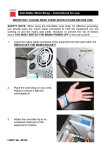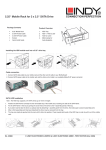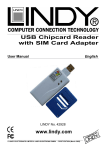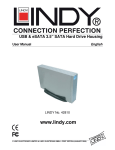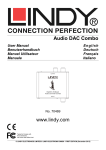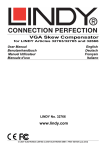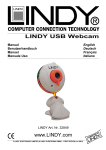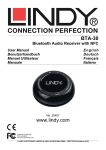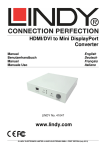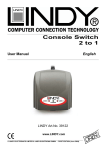Download Lindy 43118
Transcript
USB 3.0 SATA Adapter Introduction Thank you for purchasing the LINDY USB 3.0 SATA Adapter. This versatile adapter allows you to connect your SATA disk drives to your computers USB 3.0 port, without the need for dedicated drive housing. Package Contents USB 3.0 SATA Adapter with USB 3.0 cable attached Multi-Country power supply OTB Driver CD Four HDD brackets with screws to stabilize the adapter This manual Features Super Speed USB 3.0 Interface Compliant to SATA Specification Rev. 2.6 Supports 2.5”, 3.5” and 5.25” SATA drives One Touch Backup Function Installation The LINDY USB 3.0 SATA Adapter can be quickly and easily installed on Windows XP, Vista & Win7 computers. 1. Connect your SATA drive to the USB Adapter. 2. Next connect the USB Adapter to an available USB 2.0 or 3.0 port on your computer. 3. After a short while you will see the Found New Hardware message and Windows will install the drive. 4. Once Windows has finished installing your drive you will see Your new hardware is installed and ready to use. 5. Go to My Computer and you will be able to see your newly installed drive. Disconnecting (Safely Remove Hardware) Windows 1. Go to your System Tray in the bottom right of your display. 2. Double click on the Safely Remove Hardware icon. 3. You will be presented with a list of devices connected to your PC. 4. Highlight the drive you want to remove and click Stop and then OK. 5. You will then see the Safe To Remove Hardware. 6. You may now remove your drive. LINDY No. 43118 www.lindy.com Shielded cables must be used with this equipment to maintain compliance with radio frequency energy emission regulations and ensure a suitably high level of immunity to electromagnetic disturbances. FCC Warning This equipment has been tested and found to comply with the limits for a Class B digital device, pursuant to part 15 of the FCC Rules. These limits are designed to provide reasonable protection against harmful interference in a residential installation. This equipment generates, uses, and can radiate radio frequency energy and, if not installed and used in accordance with the instructions, may cause harmful interference to radio communications. However, there is no guarantee that interference will not occur in a particular installation. If this equipment does cause harmful interference to radio or television reception, which can be determined by turning the equipment off and on, the user is encouraged to try to correct the interference by one or more of the following measures: Reorient or relocate the receiving antenna Increase the separation between the equipment and receiver Connect the equipment into an outlet on a circuit different from that to which the receiver is connected Consult the dealer or an experienced technician for help You are cautioned that changes or modification not expressly approved by the party responsible for compliance could void your authority to operate the equipment. This device complies with part 15 of the FCC Rules. Operation is subject to the following two conditions: 1. This device may not cause harmful interference, and 2. This device must accept any interference received, including interference that may cause undesired operation. WEEE (Waste of Electrical and Electronic Equipment), Recycling of Electronic Products In 2006 the European Union introduced regulations (WEEE) for the collection and recycling of all waste electrical and electronic equipment. It is no longer allowable to simply throw away electrical and electronic equipment. Instead, these products must enter the recycling process. Each individual EU member state has implemented the WEEE regulations into national law in slightly different ways. Please follow your national law when you want to dispose of any electrical or electronic products. www.lindy.com


